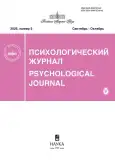Artificial intelligence in the work of a psychologist: an example of analysis of verbal forecasts. Part II.
- Авторлар: Kornilova T.V.1, Kornilov S.A.1, Wang Z.1
-
Мекемелер:
- Moscow State University named after M.V. Lomonosov
- Шығарылым: Том 46, № 5 (2025)
- Беттер: 64-75
- Бөлім: Methodes and procedures
- URL: https://stomuniver.ru/0205-9592/article/view/696884
- DOI: https://doi.org/10.31857/S0205959225050078
- ID: 696884
Дәйексөз келтіру
Аннотация
The article demonstrates the possibility of applying such artificial intelligence systems as Large Language Models to the qualitative analysis of verbal forecasts. The purpose of the psychological study was to consider the participants’ forecasts in the broad context of classifications of anticipated events in relation to the individually imagined future. The experimental design included forecasting in free statements by participants (n = 149) of “possible, improbable, impossible” events. The sample was represented by Chinese participants who gave online free descriptions of such events. According to the three conditions, 447 verbal forecasts were obtained. Their analysis using the o1-preview meta-model of advanced reasoning presented in our first article revealed several significant differences in the frequencies of forecasts for the three conditions when categorizing statements predicting the future in the context of possible, impossible and unlikely events. Eleven dimensions – criteria for classifying predicted events – showed significant differences, including impossible/surreal events, realistic expectations, fantastic scenarios, creative thinking, factual thinking, everyday routine, science fiction elements, dystopian elements, supernatural events, cultural influences, and inductive reasoning.The obtained results are important for the development of hybrid research methodologies involving humans and AI and a broader understanding of artificial cognitive systems as tools for expanding human analytical capabilities.
Авторлар туралы
T. Kornilova
Moscow State University named after M.V. Lomonosov
Хат алмасуға жауапты Автор.
Email: tvkornilova@mail.ru
125009, Moscow, st. Mokhovaya, 11, building 9, Russia.
S. Kornilov
Moscow State University named after M.V. Lomonosov
Email: sa.kornilov@gmail.com
125009, Moscow, st. Mokhovaya, 11, building 9, Russia.
Z. Wang
Moscow State University named after M.V. Lomonosov
Email: ziyiw480@gmail.com
125009, Moscow, st. Mokhovaya, 11, building 9, Russia.
Әдебиет тізімі
- Брушлинский А.В. Мышление и прогнозирование. М.: Мысль, 1979.
- Знаков В.В. Теоретические основания психологии возможного // Вестник Санкт-Петербургского университета. Психология. 2022. Т. 12. № 2. С. 122–131. doi: 10.21638/spbu16.2022.202.
- Корнилов С.А., Корнилова Т.В., Ван Цзыи. Искусственный интеллект в деятельности психолога: пример анализа вербальных прогнозов на китайской выборке. Часть 1 // Психологический журнал. 2025. Т. 46. № 4. С. 85–98.
- Корнилова Т.В. Риск и мышление // Психологический журнал. 1994. Т. 15. № 4. С. 20–32.
- Корнилова Т.В., Кондратчик А.Л. Интеллектуальные решения при использовании знаний конвенционального типа // Вестник Московского университета. Серия 14: Психология. 1993. № 3. С. 12–24.
- Корнилова Т.В., Тихомиров О.К. Принятие интеллектуальных решений в диалоге с компьютером. М.: Изд-во МГУ, 1990.
- Корнилова Т.В., Чумакова М.А., Корнилов С.А., Новикова М.А. Психология неопределенности: единство интеллектуально-личностного потенциала человека. М.: Смысл, 2010.
- Красавцева Ю.В. Эмоциональное предвосхищение в процессе принятия решений. М.: МГУ им. М.В. Ло- моносова, 2021.
- Мамардашвили М.К. Наука и культура / М.К. Мамардашвили Как я понимаю философию. М.: Прогресс, 1992. С. 291–310.
- Степаносова О.В., Корнилова Т.В. Мотивация и интуиция в регуляции вербальных прогнозов при принятии решений // Психологический журнал. 2006. Т. 27. № 2. C. 60–68.
- Hao Haiping, Lyu Houchao, Huang Xiting. The Past, Present and Future of the Chinese People: An Interpretation Based on the Psychology of Time // Psychological Research. 作者:郝海平; 吕厚超*; 黄希庭. 中国人的过去、现在和未来:基于时间心理学的阐释 // 来源:心理研究, 2023. V. 16 (04). Р. 300–309. doi: 10.19988/j.cnki.issn.2095-1159.2023.04.002.
- Kooij D.T.A.M., Kanfer R., Betts M., Rudolph C.W. Future Time Perspective: A Systematic Review and Meta-Analysis // Journal of Applied Psychology. 2018. V. 103 (8). P. 867–893.
- Li-Jun J.I., Ying Wu, Yiyin Aang. The breath of temporal information focus among Chinese people // Acta Psychologica Sinica. 2023. V. 55(3). Р. 421–434. 纪丽君, 吴莹, 杨宜音. 中国人的时间知觉广度 // 心理学报. V. 55(3). Р. 421–434. doi: 10.3724/SP.J.1041.2023.00421
- Miceli M., Castelfranchi C. Expectancy and emotion. Oxford University Press. 2015.
- Nay J.J., Karamardian D., Lawsky S.B., Tao W., Bhat M., Jain R., Lee A.T., Choi J.H., Kasai J. Large language models as tax attorneys: А case study in legal capabilities emergence // Phil.Trans.R.Soc. 2024. A382: 20230159. URL: https://doi.org/10.1098/rsta.2023.015
- Shipp A.J., Aeon B. Temporal focus: Thinking about the past, present, and future // Current Opinion in Psychology. 2019. V. 26. P. 37–43.
- Shipp A.J., Edwards J.R., Lambert L.S. Conceptualization and measurement of temporal focus: The subjective experience of the past, present, and future // Organizational Behavior and Human Decision Processes. 2009. V. 110 (1). P. 1–22.
Қосымша файлдар








